Apr 7 2015
Bruker Corporation today announced an official partnership with the University of Manchester’s National Graphene Institute (NGI), joining a select list of industrial collaborators.
 Bruker's Dimension FastScan AFM (Photo: Business Wire)
Bruker's Dimension FastScan AFM (Photo: Business Wire)
This partnership follows NGI’s purchase of two additional atomic force microscopes (AFMs) from Bruker, a Dimension FastScan® and a Dimension Icon®. These systems join five other Bruker AFMs at the facility for research into the nanofabrication and nanoscale properties of graphene. As part of this partnership, Bruker will partially sponsor a Ph.D. student working on novel scanning probe microscopy (SPM) techniques to characterize graphene and 2D materials.
Graphene, the world’s thinnest, strongest and most conductive material, was first isolated and characterized at The University of Manchester by Sir Andre Geim and Sir Kostya Novoselov, who were awarded the Nobel Prize for Physics in 2010 for their research. This transparent, one-atom thick flat sheet of carbon has the potential to revolutionize technology, from smartphones and ultrafast broadband to drug delivery and computer chips. AFMs have demonstrated spatial resolution of less than a nanometer, and enable scientists developing materials such as graphene to understand critical mechanical, electrical, and chemical properties at the atomic scale.
“Our Bruker AFMs are anticipated to provide important new insights into nanoscale variations of graphene conductivity and work function,” said Nobel Prize winner Professor Novoselov. “Coupled with simultaneous quantitative mapping of mechanical properties, enabled by Bruker’s exclusive PeakForce Tapping®, NGI researchers hope to uncover new information that will ultimately optimize the performance of graphene-based materials and devices.”
“We are pleased that the National Graphene Institute continues to rely on our proprietary technology for its new world-class research facility, bringing their total now to seven Bruker systems,” added Paul Scagnetti, Ph.D., President of Bruker’s Nano Surfaces Division. He continued: “We are also gratified to be a part of the UK-wide Centre for Doctoral Training, where our unique AFM technologies will enable the sponsored Ph.D. student to learn even more about the physical and electrical properties of 2D materials under Professor Novoselov.”